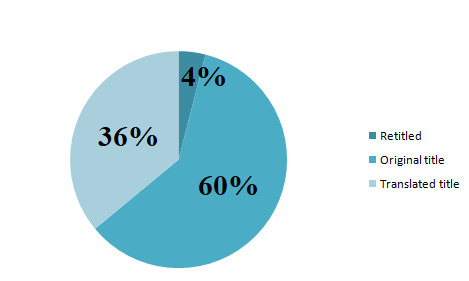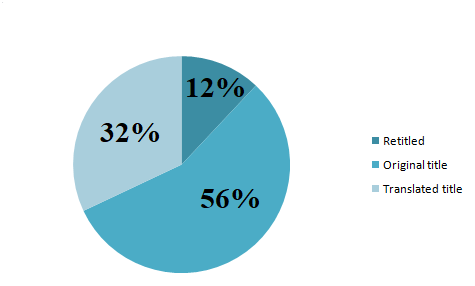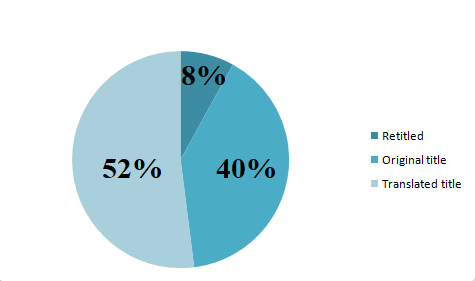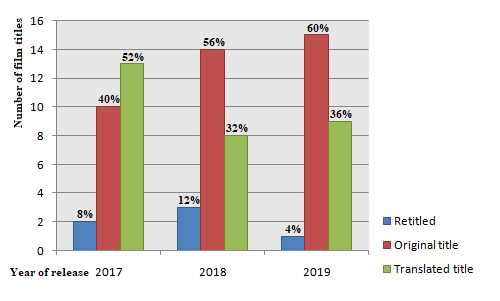Abstract
The title is the most important part of a film marketing strategy as it captures the audience before any other movie feature. It can be interpreted as the trademark that potential viewers consider primarily when choosing a film amongst endless lists and charts. Thus, it plays a pivotal role in the further success of a film not only domestically but also worldwide when translated or adapted for various and diverse prospective audiences. There is a noticeable trend in American films when they are distributed in France; the titles remain in English but do not necessarily keep the original one. American titles of films are translated, retitled in English or keep the original title regardless of the language spoken by the target audience. In the present paper, we discuss the title decision-making process for American films that are distributed in France compared to those distributed in other French speaking territories such as Quebec by describing some common patterns in order to find out why film distributers translate some film titles but not others. We also attempt to observe how this new trend has been evolving over the last three years and how it may or may not affect the film product as a whole.
Keywords: Film titletarget audienceoriginal titletranslated titleadapted titlefilm distribution
Introduction
A film title is a concise statement that provides insight into the genre and premise of a given film. The translator has to capture the semantic multidimensionality of the original title in order to convey the same vision and tonality embodied in the original title, and thus any film title must be studied as a complex linguistic unit. Title translation plays an instrumental role in intercultural communication as it reflects the cultural and sociopolitical situation or shifts in the world (Aleksandrova, 2018). Given the fact that this variety of translation could face numerous both intra and extra lingual challenges, e.g., trademark infringements, it could turn into a hot potato for interpreters. A film title has a major influence on the fate of a film as it can be a potential key to a film’s success on the market since it may or may not appeal to the target audience.
When translating foreign film titles, not only are the source text elements translated, but also adapted to the culture of the target audience i.e. transition from one language and cultural code to another. The challenge of translating film titles is also due to the intersection of artistic and commercial discourses. A translator faces a difficult choice between fidelity to the original title, revealing the content of the film, its genre, author’s intention, and prioritizing advertising / commercial purposes (Anissimov et al., 2019). According Nord (2019), insisting on a “faithful” translation of the original name is ineffective; besides, in the film industry, there are numerous arguments against literal translation, and not only from a linguistic point of view.
It is also necessary to emphasize that the linguistic and cultural localization of movie titles is collective creativity. In this process, with varying degrees of influence on the result, several translators, distribution companies and advertising agencies can take part at once. The final word, as a rule, remains with the latter (ibid). Nonetheless, the translated title must meet certain imperative criteria. It is essential for the title to be intelligible for the targeted audience, it must have a logical connection with the storyline of the film and, last but not least, the title has to be marketable (Aubertot, 2016).
Problem Statement
As it was mentioned above, some films keep the original English title when distributed in France but others are adapted in English for a French speaking audience. The process of re-titling is usually due to the fact that French people may not understand or pronounce certain English words present in the original title which is, as a matter of fact, quite crucial for the promotion of any film (Leclerc, 2018). Catchy or shocking words, in order to attract larger audiences, are likewise, a notable reason for title discrepancies (Araujo, 2016). Still, is the translation of film titles into French almost to go by the wayside?
"The French public has become quite familiar with the English language and, as a result, we are translating fewer and fewer titles," says a MK2 distribution executive in the October 2008 issue of Studio magazine.
According to a "cinema sociologist" interviewed in the same magazine, if the titles of Anglo-Saxon films are less and less translated, "it's not really bad. It is a sign of cultural openness and that France has now absorbed the Anglo-Saxon culture” (Le monde, 2008, para. 73).
Research Questions
When distributed in France, there is a noticeable trend in American films; the titles remain in English but do not necessarily keep the original one. To translate, keep the original English title or introduce new one but still in English, irrespective of the language the target audience speaks? How do they settle upon titles for American movies released in France compared to those distributed in other francophone regions like Quebec, for example? Is the film product itself affected by contemporary tends? Why are some movie titles being translated but not others? For what purpose, bearing in mind that it is intended for non-English speaking audiences? And finally yet importantly, where is this evolution heading? These are some of the issues that we will be addressing in the current exploration.
Purpose of the Study
The central purpose of this study is to compare the numbers of American films that have been distributed in France under an English title (original or retitled in English) and those that have been translated in order to reveal new tendencies in American film title translation in French distribution.
Research Methods
The present article describes an empirical approach that involves both quantitative and qualitative research. We start by observing common patterns in American film titles upon distribution in France in comparison to Quebec. We identify three main practices, which are:
Keeping the original American title
Translating the title into French
Paraphrasing / retitling the title in English
Then, we introduce quantitative research by comparing numbers from samples collected from IMDb: Internet Movie Database with the purpose of observing the progress of this new trend throughout the last three years.
Common Patterns in Film Titles upon Distribution
Primarily, it is necessary to identify the target audience that the film product is intended for children, teenagers, students, elderly people, etc., and thus the image that one wants to convey, then its genre. A film often belongs in between two genres. Do we want to sell it as a comedy? As a drama? Or as a horror movie? These questions should be taken into account for providing a suitable title. Although one can identify some common patters, there will always be a few exceptions.
We usually translate film titles that are intended for children.
Example: “
“
Exception: “
“
Unlike France, the Quebec is bind by law to translate everything into French, for instance, commercial signs or film posters in our case. This law referred to as the Charter of the French language (or Bill 101) that has been passed in 1977 and is aimed at preserving the French language as the official language since Quebec is a French enclave completely surrounded by Anglophones.
We change or translate titles that are not clear for the target audience
Example: “
“
“
At first glance, the Quebecois title is a literal translation; however, three different measurement systems have been used by Quebec since 1534. Nowadays, young people express distance in meters and the older ones in feet.
We translate or adapt the film title in English if it is too hard to pronounce or remember (exception:
Extremely Wicked, Shockingly Evil and Vile
Example: “
“
“
The main purpose of releasing films with English titles for a non-English speaking audience is to highlight the American origin of the movie. English can become a selling point when the film is intended for an adolescent audience, hence “
Data Collection and Analysis
Let us look at this tendency throughout the last three years by comparing three blockbuster lists that have been ranked by IMDb: Internet Movie Database. We will compare the top 25 films from each list with translated, adapted or that kept the original title upon distribution in France in order to demonstrate whether this trend is increasing. The list for 2019 is ranked by expected worldwide box office (Table
-
Retitled: 1 out of 25 (4 %)
-
Original title: 15 out of 25 (60 %)
-
Translated titles: 9 out of 25 (36 %)

-
Retitled: 3 out of 25 (12 %)
-
Original title: 14 out of 25 (56 %)
-
Translated titles: 8 out of 25 (32 %)

-
Retitled: 2 out of 25 (8 %)
-
Original title: 10 out of 25 (40 %)
-
Translated titles: 13 out of 25 (52 %)

Findings
The bar chart mirrors a growing tendency of keeping the original title or re-titling it in English compared to titles translated for distribution in France based on the data collected from 2017 to 2019.
When we compare the number of film titles that have not been translated in 2017 and 2019, we notice immediately that it has increased significantly, by 20 %.

The number of adapted film titles peaked in 2018 but went down by half in 2019 (in comparison to 2017). This trend was expected to grow as it allows distributers to incorporate eye-catching words in the title as a marketing strategy to attract more viewers.
Conclusion
A film title plays a major role in the promotion and further success or failure of any motion picture. The process of finding a title has turned into an art form of its own. Analogously to a person’s name, it marks the film permanently and sets the first and last impression. The translated title is equally as important, if not more so, as the original one. The translation of a film title is quite challenging taking into account the fact that language and culture are closely intertwined.
A title, translated, adapted or unchanged must satisfy crucial requirements. It is indispensable for the chosen title to be comprehensible, directly connected to the storyline of the film and, finally yet importantly, it has to be appealing and consequently easily sold.
By comparing all three pie charts, we can clearly observe that in 2017 about half of American film titles were translated into French but over the last three years these numbers have changed significantly. The majority of American films are now released under an English title, reflecting an undeniable growth in this new trend.
The data selected for the current investigation are not sufficient to supply precise statistics. However, through their prism, tendencies can be easily perceived and they can serve as a solid basis for further more in depth research on the same topic.
References
- Aleksandrova, O. I. (2018). Foreign Film Title: Translation or a New Naming Unit? In Naming in Different Areas of Communication Field. Collect. monigraph. (pp. 107–136). Carleton University.
- Anissimov, V. Е., Borissova, A. S., & Konson, G. R. (2019). Linguocultural Localization of Movie Titles. Russ. J. of Linguist., 23(2), 435–459. https://doi.org/10.22363/2312-9182-2019-23-2-435-459
- Araujo, C. (2016). https://www.sites.univ-rennes2.fr/lea/cfttr/veille/2016/02/05/la-traduction-des-titres-de-films/
- Aubertot, J. (2016). La traduction des titres de films. https://www.sites.univ-rennes2.fr/lea/cfttr/veille/2016/02/05/la-traduction-des-titres-de-films/
- Le monde. (2008). Alors, on ne traduit plus? https://www.lemonde.fr/blog/correcteurs/2008/10/23/alors-on-ne-traduit-plus/
- Leclerc, F. (2018). Pourquoi traduire les titres de films anglais... en anglais? https://www.lexpress.fr/culture/cinema/pourquoi-traduire-les-titres-de-films-anglais-en-anglais_1575343.html
- Nord, C. (2019). Paving the Way to the Text: Forms and Functions of Book Titles in Translation. Russ. J. of Linguist., 23(2), 328–343. https://doi.org/10.22363/2312-9182-2019-23-2-328-343
Copyright information

This work is licensed under a Creative Commons Attribution-NonCommercial-NoDerivatives 4.0 International License.
About this article
Publication Date
27 October 2020
Article Doi
eBook ISBN
978-1-80296-091-4
Publisher
European Publisher
Volume
92
Print ISBN (optional)
-
Edition Number
1st Edition
Pages
1-3929
Subjects
Sociolinguistics, linguistics, semantics, discourse analysis, translation, interpretation
Cite this article as:
Moctar, A. (2020). American Film Titles In French Distribution. In D. K. Bataev (Ed.), Social and Cultural Transformations in the Context of Modern Globalism» Dedicated to the 80th Anniversary of Turkayev Hassan Vakhitovich, vol 92. European Proceedings of Social and Behavioural Sciences (pp. 750-757). European Publisher. https://doi.org/10.15405/epsbs.2020.10.05.101

